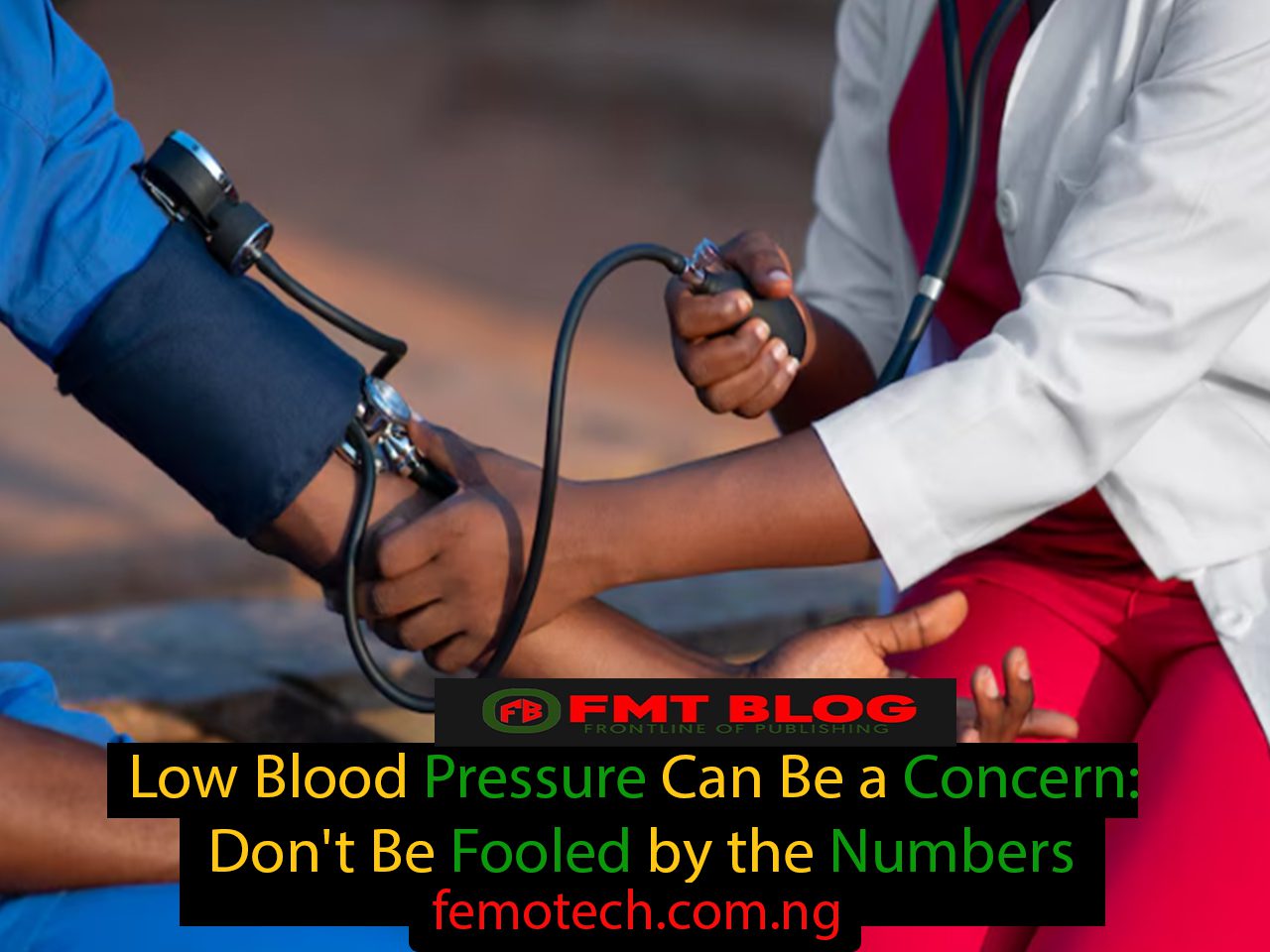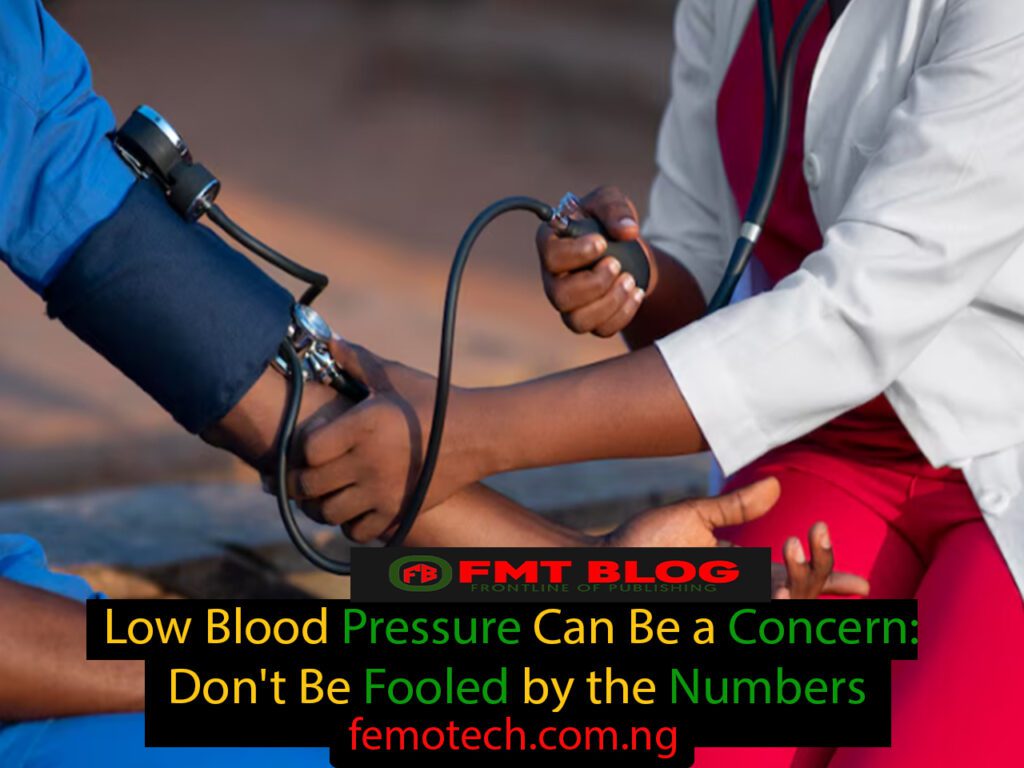
Don’t be fooled by the numbers! Low blood pressure can be serious too. Learn the causes, symptoms, and how to prevent it.

Introduction
A friend once told me while having a discussion with her, “Don’t worry about your low blood pressure; high blood pressure is the real problem; be thankful yours is low!”
Her words made me curious. Then it gets me really asking: Is low blood pressure really nothing to worry about? While high blood pressure is a well-known health risk, could low blood pressure be a hidden danger? Well, before we go further, it will be best to understand what blood pressure is.
Blood Pressure
Let me explain what blood pressure is in a simple way. Blood pressure is a kind of pressure gauge, like the one you might use to check the air in your car tires. Blood pressure is the force of blood pushing against the walls of your arteries as your heart pumps blood throughout your body. It’s like a wave of blood rushing through your vessels. This pressure is important because it helps deliver oxygen and nutrients to all your organs. Blood pressure is typically measured in two numbers: systolic (the top number) and diastolic (the bottom number).
The systolic number is the pressure when your heart beats and pushes blood out to your body. The diastolic number is the pressure when your heart relaxes between beats. Normal blood pressure is generally considered to be less than 120/80 mmHg (millimeters of mercury). This means the top number is less than 120, and the bottom number is less than 80. However, if your blood pressure falls much below this range, it can be a sign of low blood pressure or hypotension.
Causes and Symptoms of Low Blood Pressure
It’s true that having lower blood pressure can be a good thing, especially for young, healthy people. But for some folks, low blood pressure can actually be a cause for concern, especially if they’re experiencing certain symptoms. There are many reasons why someone might have hypotension. Sometimes it can be caused by simple things like not drinking enough water throughout the day (dehydration) or by taking certain medications.
Other times, it can be a sign of a more serious underlying medical condition, like a problem with the heart or the endocrine system (the glands that produce hormones in your body). If you’re concerned about your low blood pressure, it’s always best to talk to your doctor to see if there’s anything you need to worry about.
Common symptoms of low blood pressure
- Dizziness or lightheadedness
- Feeling faint
- Fatigue
- Blurred vision
- Difficulty concentrating
- Cold, clammy skin
- Rapid heartbeat (in some cases)
Dangers of Low Blood Pressure
While not as common as high blood pressure, chronically low blood pressure can lead to some pretty serious health problems. Imagine your blood pressure as the force that pushes blood through your body, delivering oxygen and nutrients to all your organs. When your blood pressure is low, it means that force is weaker than normal.
This may indicate that your organs aren’t receiving enough oxygen and nutrients to keep them healthy. This can cause harm over time, particularly to vital organs like your heart, brain, and kidneys. In severe cases, hypotension can even cause you to faint or pass out, and in very rare situations, it can even be life-threatening.
When to See a Doctor
If you’re feeling dizzy, lightheaded, faint, fatigued, or having trouble concentrating, and you suspect it might be because of low blood pressure, it’s a good idea to see your doctor. They can check your blood pressure and do some tests to see if there’s an underlying cause for your low blood pressure. Early diagnosis and treatment can help prevent any serious complications from low blood pressure. Remember, even though hypotension might not seem as scary as high blood pressure, it’s still important to get checked out by your doctor if you’re concerned.
Preventing Low Blood Pressure
There are steps you can take to help prevent hypotension or manage it if you’re already experiencing it. These include:
- Staying hydrated: Drink plenty of fluids throughout the day, especially in hot weather or during exercise.
- Increasing your salt intake (but consult your doctor first, especially if you have other health conditions)
- Eating a healthy diet rich in fruits, vegetables, and whole grains
- Getting regular exercise
- Avoiding excessive alcohol consumption
- Wearing compression stockings can help improve blood flow in some cases
Follow us on socials → Telegram | X/Twitter | Facebook | WhatsApp |WhatsApp Channel |Mobile App
Try to be sensitive. If you notice that you are feeling lightheaded, dizzy, or unusually tired and you suspect it might be related to low blood pressure, don’t hesitate to talk to your doctor. They can measure your blood pressure and ask you some questions about your medical history and lifestyle habits. This will help them understand what might be causing your low blood pressure and recommend the best course of action for you. It’s always better to be safe than sorry, especially when it comes to your health. Even if your low blood pressure isn’t a major concern right now, your doctor can help you monitor it and make sure it doesn’t become a problem in the future.



